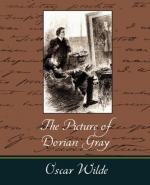At the corner of the pine-wood he caught sight of Sir Geoffrey Clouston, the duchess’s brother, jerking two spent cartridges out of his gun. He jumped from the cart, and having told the groom to take the mare home, made his way towards his guest through the withered bracken and rough undergrowth.
“Have you had good sport, Geoffrey?” he asked.
“Not very good, Dorian. I think most of the birds have gone to the open. I dare say it will be better after lunch, when we get to new ground.”
Dorian strolled along by his side. The keen aromatic air, the brown and red lights that glimmered in the wood, the hoarse cries of the beaters ringing out from time to time, and the sharp snaps of the guns that followed, fascinated him and filled him with a sense of delightful freedom. He was dominated by the carelessness of happiness, by the high indifference of joy.
Suddenly from a lumpy tussock of old grass some twenty yards in front of them, with black-tipped ears erect and long hinder limbs throwing it forward, started a hare. It bolted for a thicket of alders. Sir Geoffrey put his gun to his shoulder, but there was something in the animal’s grace of movement that strangely charmed Dorian Gray, and he cried out at once, “Don’t shoot it, Geoffrey. Let it live.”
“What nonsense, Dorian!” laughed his companion, and as the hare bounded into the thicket, he fired. There were two cries heard, the cry of a hare in pain, which is dreadful, the cry of a man in agony, which is worse.
“Good heavens! I have hit a beater!” exclaimed Sir Geoffrey. “What an ass the man was to get in front of the guns! Stop shooting there!” he called out at the top of his voice. “A man is hurt.”
The head-keeper came running up with a stick in his hand.
“Where, sir? Where is he?” he shouted. At the same time, the firing ceased along the line.
“Here,” answered Sir Geoffrey angrily, hurrying towards the thicket. “Why on earth don’t you keep your men back? Spoiled my shooting for the day.”
Dorian watched them as they plunged into the alder-clump, brushing the lithe swinging branches aside. In a few moments they emerged, dragging a body after them into the sunlight. He turned away in horror. It seemed to him that misfortune followed wherever he went. He heard Sir Geoffrey ask if the man was really dead, and the affirmative answer of the keeper. The wood seemed to him to have become suddenly alive with faces. There was the trampling of myriad feet and the low buzz of voices. A great copper-breasted pheasant came beating through the boughs overhead.
After a few moments—that were to him, in his perturbed state, like endless hours of pain—he felt a hand laid on his shoulder. He started and looked round.
“Dorian,” said Lord Henry, “I had better tell them that the shooting is stopped for to-day. It would not look well to go on.”




